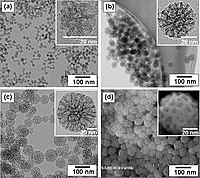
Photo from wikipedia
Abstract Heat generation in small devices hinders the optimum performance of such equipment. Microchannel heat sinks (MCHS) with embedded pins are a common solution to this problem. The performance of… Click to show full abstract
Abstract Heat generation in small devices hinders the optimum performance of such equipment. Microchannel heat sinks (MCHS) with embedded pins are a common solution to this problem. The performance of these heat sinks is, however, highly dependent on the pin configuration and the coolant properties. Despite known nanoparticle stability problems, nanofluids have been extensively used to improve coolant conductivity. This study is dedicated to the analysis of nanoparticle-based coolants in randomly distributed pin-based MCHS with special attention to nanoparticle adsorption on pin surface. Statistical analysis showed that the behavior of different random realizations is different, and an averaged behavior can be found depending on the number of embedded pins. The averaged behavior is used to analyze the effects of pin configuration and coolant properties. It is shown that the performance of random distributions outweighs that of the inline one, and that as the number of pins increases, the effects of randomness decrease. The impact of nanoparticles on heat transfer is more highlighted as the number of pins decreases. Nanoparticle adsorption on the pin surface is found to have double-edged effects and can be beneficial or detrimental to heat removal and these effects depend on the pins' configuration. It is shown that nanoparticle adsorption on pin surface has generally negative effects on heat removal performance but it can be outweighed by the positive effects of nanoparticle-driven surface area stimulation.
Journal Title: International Journal of Heat and Mass Transfer
Year Published: 2019
Link to full text (if available)
Share on Social Media: Sign Up to like & get
recommendations!